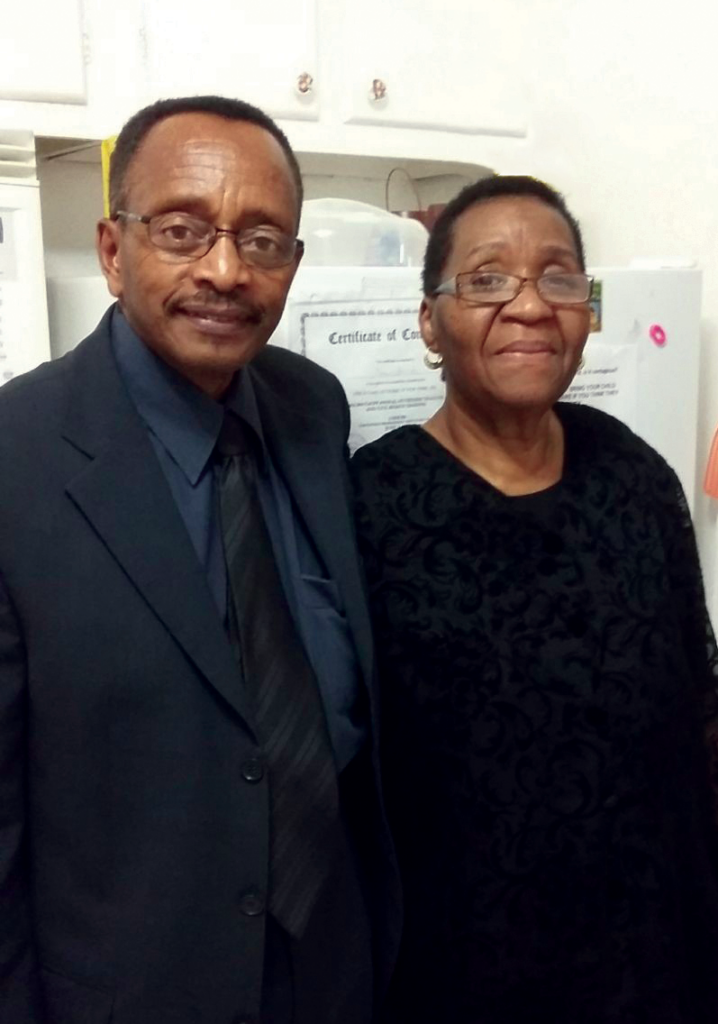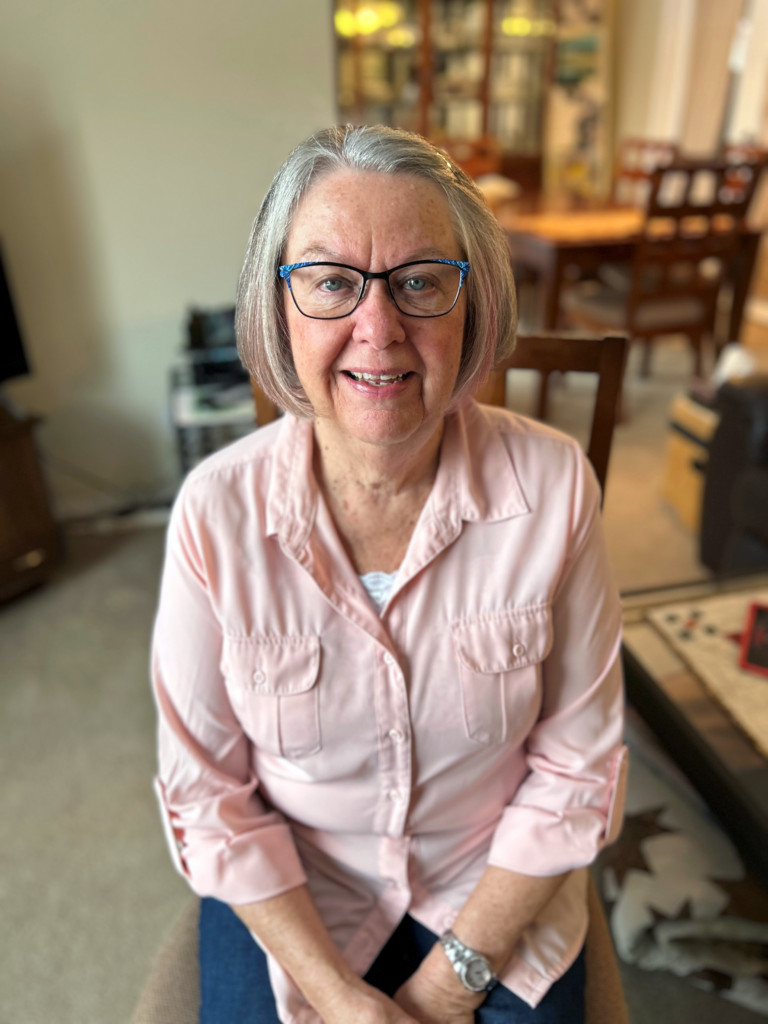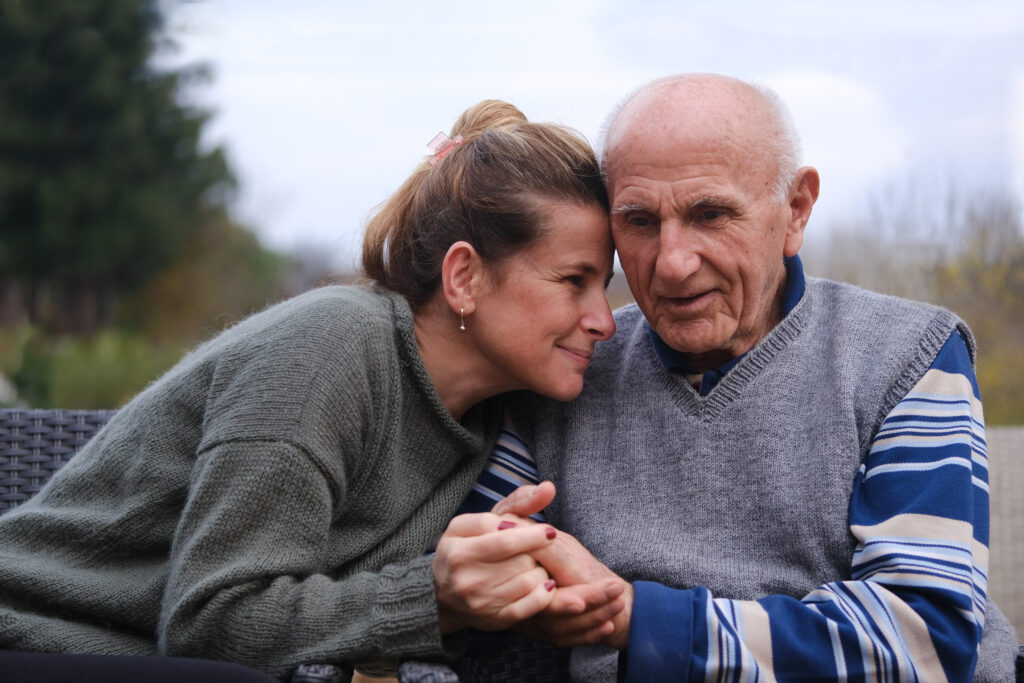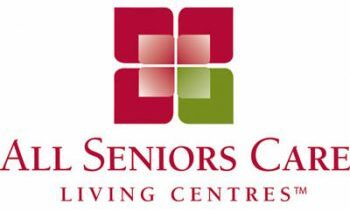Alzheimer’s Awareness Month
- January is National Alzheimer’s Awareness Month
- To Correct or Connect? – A Story by Gary Elbers
- Sharing Your Story with Others Who Understand
Support & Education
January is National Alzheimer’s Awareness Month
January is Alzheimer’s Awareness Month and we’re sharing personal stories from Manitobans that will help you increase your understanding of dementia and how the Alzheimer Society can help you on your path forward when navigating cognitive changes or a diagnosis.
Learn about the experiences of three unique individuals: Gary, Tanis and Denise. Through their stories, you’ll learn why the Alzheimer Society is a place to turn for support, information and resources – from early dementia symptoms to diagnosis and throughout the progression of the disease. Their perspectives shine a light on why connecting with a community of support through the Alzheimer Society is so important. Read their stories here.
Visit our official campaign webpage to learn more about dementia and the many ways the Society can help you and your family. Follow us on Facebook, Instagram, X and LinkedIn stay up to date about dementia, our programs and services, what’s happening in our community and so much more.
To Correct or Connect? – A Story by Gary Elbers
Thank you to our spokesperson, Gary Elbers, for sharing this insightful story.
His piece relates more closely to those caring for someone living with early to moderate signs of dementia.
If you’re caring for someone further along in the progression of dementia and would like to discuss strategies for everyday care, our First Link® Client Support team is here to help.
No matter where you are at in navigating dementia, you can connect with us for support and resources to fit your unique needs. It’s never too late to get support.
To Correct or Connect?
That is the troubling question when interacting with a loved one experiencing dementia.
From very early childhood we are coached, encouraged, trained, rewarded and expected to ‘get it right’. So, we developed an innate desire to ensure that everyone, especially those with whom we interact, `gets it right`. We dedicate time to discuss, debate, convince or be convinced about ‘true facts’ and occasionally we exhibit some constraints based on maturity. However, it is natural and instinctive to help those we love, to know or do the correct thing. Sometimes though, situations or conditions develop that can challenge this natural instinct. Dementia is one of those conditions.
Before I learned it was dementia affecting my wife’s brain, we were forever in a fluctuating relationship. Some days were normal, and others would be confusing and unpredictable. Because her cognitive facets were affected, I saw no physical indicators nor recognized the display as signs or symptoms of dementia. This resulted in continual debates/arguments, frustration and resentment, often ending with her angrily saying “Do you think I am stupid?”
It was obvious I needed help and the Alzheimer Society is where I found it and continue to find it today. The benefits of the First Link Client Support program – counselling, workshops, support groups, videos etc. are undeniable. I began to recognize dementia’s impact on my wife and the need for empathy from me. The involvement, reliance and guidance provided by the Alzheimer Society enabled me to understand the stages of dementia. Through the learnings and education I received from the staff, I have developed a 4 R’s approach to support myself and my wife: Remember, Refrain, Restrict and Restrain.
Remember it is the dementia (cognitive impairment) and not my wife that is causing the behavior. So stop feeling or thinking it will change if only I do or say…..
Refrain from being a ‘helicopter spouse’. Always hanging around, ‘spying’ on her, worrying she may do something unsafe. l encouraged more ‘Tea Breaks’, where we relaxed with munchies (some of which I helped prepare). Eventually, it became ‘normal’ to do more things together.
Restrict my (involuntary) reaction that might startle, scare and/or embarrass, which could result in her becoming mad or sad. I gradually began to ensure that our home became more dementia-friendly and dementia-safe.
Restrain from always correcting, commenting, criticizing and questioning her actions and statements. ‘Biting my tongue’, listening more and even trying to find some element (however minor) to make a favourable comment and gradually changing the conversation or focus.
This approach improved our relationship and decreased the stress, conflict and resentment. Now, when dealing with any situation, I ask myself the following three questions (I encourage you to ask similar questions when interacting with your loved ones):
- Who has the ‘normal’ functioning brain?
- Is correcting her a safety or life-or-death situation?
- Would I prefer to correct or connect with my loved one?
My answers justify our relationship.
Gary Elbers
Sharing Your Story with Others Who Understand
When care partner, Denise Jacobs felt she was ready to join a support group at the Alzheimer Society, it was during the height of COVID – an especially tough time for many navigating dementia and looking for support.
Denise joined one of the Society’s virtual support group offerings over Zoom, which not only let her connect with others during an isolating time but also allowed her to easily access support without having to travel, since she and her husband David, who lives with dementia, live outside of Winnipeg.
For Denise, the support she received from other care partners in her group has made a big impact.
“The fact that you see the nodding heads and the smiles – it’s like they’re saying ‘yes, yes I get it, I understand,’ she says. “That’s the reason I go honestly, to talk to people who get it. You don’t have to pretend everything is okay.”
“You can tell your story exactly as it is.”
Denise says that some of the others in her support group have spouses who are further down the road with dementia than she and David are. Hearing about other care partners’ experiences and what they’re going through at different points in their journey, helps Denise feel more prepared for what’s ahead.
“It can be scary sometimes to hear about the things others are experiencing who are further along in the dementia progression, but the advice I take away is helpful,” says Denise. “I can start looking toward the future and how to navigate challenges David and I may face.”
When you join a support group, you connect with a community of others you can lean on for guidance, encouragement and understanding, which can be a truly grounding and comforting experience.
The Society offers groups for people living with dementia and for care partners both in-person across the province and virtually via Zoom. There are a variety of unique groups to choose from, so you can find the right fit for you.
Call us at 204-943-6622 (Winnipeg) or 1-800-378-6622 (Manitoba), or email [email protected] and we can help you find the best support group to meet your needs.
For a complete listing of support groups, visit the links below:
Support Groups for Care Partners
Support Groups for People Living with Dementia
We welcome everyone to this inclusive environment for people of different ethnicities, cultures or persons who identify as part of the 2SLGBTQ+ community.
Understanding Responsive Behaviours
Caring for someone living with dementia can be challenging and, at times, overwhelming. Changes in the person’s behaviour, including responsive behaviours, can feel especially frustrating for care partners, which is a normal and valid reaction.
Taking the time to understand responsive behaviours can help you better respond to situations with more patience and empathy.
Responsive and reactive behaviours are terms commonly used to refer to actions, words or gestures presented by someone living with dementia as a way of responding to something negative, frustrating or confusing in their social and physical environment.
Some common examples of responsive behaviours include:
- Aggression
- Agitation
- Wandering
- Restlessness
- Hallucinations
- Paranoia
- Making unexpected noises
Responsive behaviours are often exhibited due to challenges experienced by the person living with dementia as they try to understand the world around them. Their increased difficulty with communication makes it tougher to express feelings of distress, pain, frustration or other unmet needs such as loneliness, boredom or something as simple as being thirsty or feeling too hot.
To help you better understand responsive behaviours, it’s important to remember that:
- All behaviour has meaning
- Behaviour is usually a response to something
- Behaviours are complex
- Consider whether the behaviour is upsetting or a risk for the person or others. If not, does anything need to be done?
- The person is not trying to be difficult
- It is only after understanding the behaviour that we can find solutions to address it
Figuring out what is triggering the behaviour and finding a way to connect with the person can often be a good place to start. Sometimes the simple things, like a smile or holding their hand, can go a long way.
If you are experiencing this in your current situation, we encourage you to register for our free online education session about responsive behaviours coming up this February: Understanding Responsive Behaviours | Family Education Registration
Below are further resources and support about understanding and responding to responsive behaviours:
- Read more about the impacts of dementia on an individual and learn how to better connect and respond: Conversations About Dementia and Responsive Behaviours | Alzheimer Society Canada
- Join a support group: Support Groups for Care Partners | Alzheimer Society of Manitoba
- Connect with us if you need individual support, or fill out our online form and we’ll call you: Get Support Today | Alzheimer Society of Manitoba
After-Hours Telephone Support: Every Monday & Wednesday
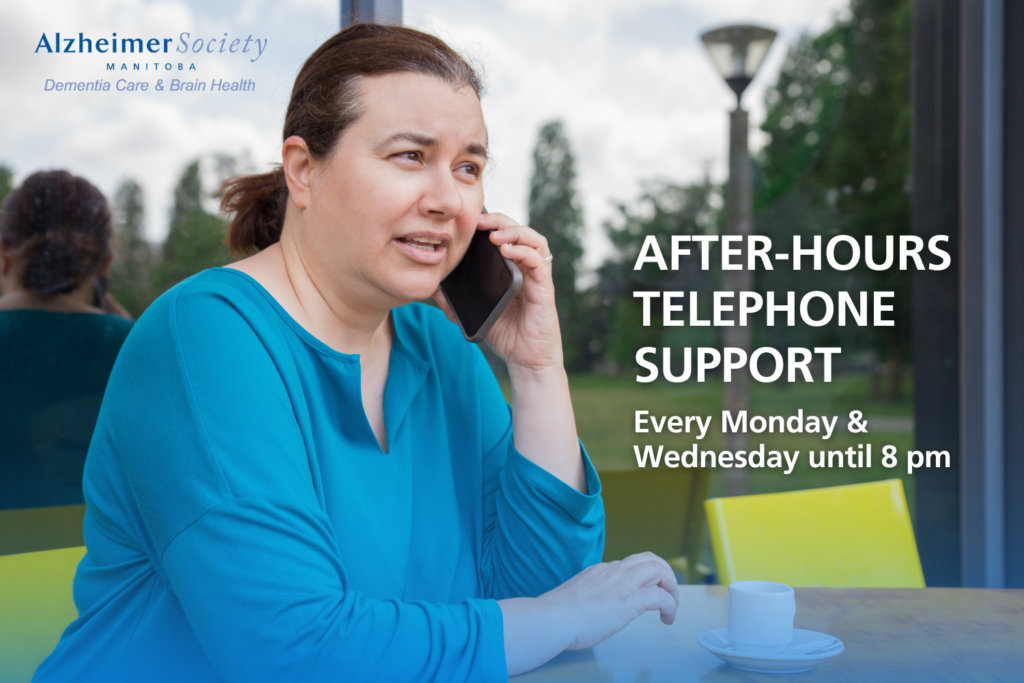 Sometimes our days can get busy with errands, appointments or work. If it’s challenging for you to call us during daytime hours, we have a new pilot project offering extended telephone support every Monday and Wednesday evening until 8 pm. Depending on the popularity of this pilot project, we may continue offering this support in the future.
Sometimes our days can get busy with errands, appointments or work. If it’s challenging for you to call us during daytime hours, we have a new pilot project offering extended telephone support every Monday and Wednesday evening until 8 pm. Depending on the popularity of this pilot project, we may continue offering this support in the future.
Our First Link® Client Support team is ready to listen and help guide you through all aspects of dementia or caregiving. We hope these extended hours help give more people an opportunity to connect with us for support, resources and information.
Call us at 204-943-6622 (Winnipeg) or 1-800-378-6622 (Provincial).
Check Out Our Upcoming Online Education Sessions
 Join us to learn about a variety of topics including income tax and financial matters, and more. These sessions are free to attend and offered via Zoom.
Join us to learn about a variety of topics including income tax and financial matters, and more. These sessions are free to attend and offered via Zoom.
Click here to register for all Family Education sessions.
Here’s what’s coming up:
Living with Dementia First Steps – Part 1
*Please note you do not need to attend the Living with Dementia series in order. The first session of a three-part information series for people supporting someone recently diagnosed with dementia. In this webinar, learn more about the progression of dementia and the Alzheimer Society of Manitoba’s programs and services.
Saturday, January 11 | 10 – 11:45 am
Income Tax and Other Financial Matters
When a person is diagnosed with dementia, there are many financial considerations that may include opportunities for tax credits, grants and other forms of financial incentives. Learn about various options and benefits available to people living with dementia and their care partners.
Tuesday, January 14 | 2 – 3 pm
Understanding Responsive Behaviours
Responsive and reactive behaviours are terms commonly used to refer to actions, words or gestures presented by a person living with dementia as a way of responding to something negative, frustrating or confusing in their social and physical environment. In this session Terri Bowser will introduce responsive behaviours, while focusing on potential causes and triggers, as well as effective ways for care partners to respond.
Tuesday, February 4 | 2 – 3 pm
You can choose to watch these online sessions in-person at the Alzheimer Society office (10-120 Donald Street, Winnipeg) – the speaker will not be presenting in-person. Please email [email protected] if you are interested in this option.
Visit the links below for more details on our winter education sessions and to register.
Winter 2025 Family Education Calendar
Family Education – Upcoming Seminars
Family Education programs sponsored by:
Stay Social & Challenge Your Brain with Community Programs
 Did you know that staying socially active and challenging your brain through games or activities are two ways you can reduce the risk of dementia or help slow the progression of dementia symptoms?
Did you know that staying socially active and challenging your brain through games or activities are two ways you can reduce the risk of dementia or help slow the progression of dementia symptoms?
Staying connected socially helps you stay connected mentally! Research shows that regularly interacting with others may help reduce your risk of developing dementia. Having an active social life can also reduce your stress, brighten your mood and keep your relationships strong – all great things for your brain health.
Just as exercising our bodies helps us stay physically healthy, exercising our minds by challenging our brains does the same for our brain health. This can be as simple as dialing the phone with your less dominant hand or as complex as learning a new language. The goal is to give your brain a new experience every day.
Our Minds in Motion® and Community Partner Programs can help both people living with dementia and their care partners stay social while exercising their brains. These programs give you the opportunity to meet new people and form friendships, get out into the community, learn something new and express yourself in a safe, judgment-free environment.
Check out the Minds in Motion® and Community Partner Program sections below for information on our Winter program offerings.
Want to learn more about brain health and reducing the risk of dementia? Check out Brain Health | Alzheimer Society of Manitoba
Register for Minds in Motion® Winter Sessions
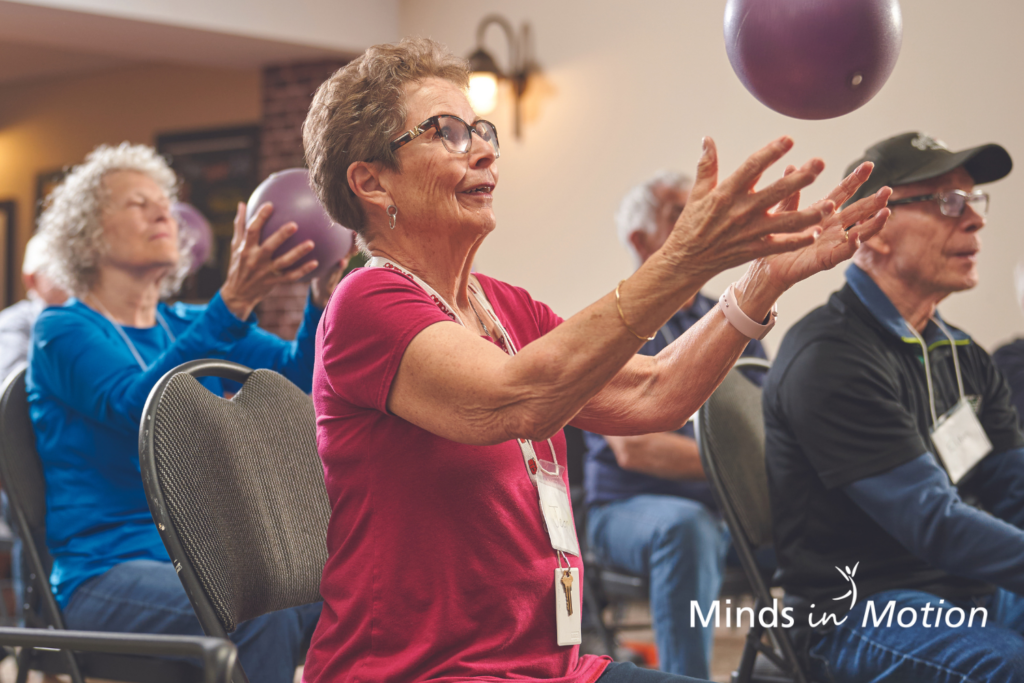 Our popular Minds in Motion program connects people living with early to moderate signs of dementia and their care partners through fitness, fun and friendship. Participants take part in a gentle chair fitness class followed by socially engaging activity and conversation. There are lots of laughs and social interaction during these sessions.
Our popular Minds in Motion program connects people living with early to moderate signs of dementia and their care partners through fitness, fun and friendship. Participants take part in a gentle chair fitness class followed by socially engaging activity and conversation. There are lots of laughs and social interaction during these sessions.
Visit our Minds in Motion page for more information and to register now.
(Cost is $65/pair unless noted).
View the information below to see winter 2025 dates and locations. All locations are now open for registration.
Winnipeg Locations
Faith Lutheran Church – 1311 Dakota St
Thursdays, 10 am – 12 pm AND 6 – 8 pm
Jan 23 – Mar 13
Call the Alzheimer Society of Manitoba to register: 204-943-6622
Registration for the morning session is now closed
Register online for the evening session
Rady JCC Fitness Centre – 123 Doncaster St
Wednesdays, 10 am – 12 pm
Jan 22 – Mar 12
Call to register: 204-477-7510
Riverwood Square – 1778 Pembina Hwy
Tuesdays, 10 am – 12 pm
Jan 21 – Mar 11
Call to register: 204-275-7632
The Wellness Institute – 1075 Leila Ave
Wednesdays, 1:30 – 3:30 pm
Jan 22 – Mar 12
Call to register: 204-632-3900
YMCA (Elmwood-Kildonan) – 454 Kimberly Ave
Thursdays, 1:30 – 3:30 pm
Jan 23 – Mar 13
Call to register: 204-668-8140
YMCA (West Portage) – 3550 Portage Ave
Tuesdays, 1 – 3 pm
Jan 21 – Mar 11
Call to register: 204-889-8052
Regional Locations
ALTONA
The Gardens on Tenth – 140 10 Ave NE
Mondays, 1:30 – 3:30 pm
Jan 20 – Mar 17
*NO SESSION ON FEB 17*
Call to register: 1-204-324-8945
BRANDON
Seniors for Seniors – 311 Park Ave East
Thursdays, 1:30 – 3:30 pm
Feb 6 – Apr 3
Call to register: 1-204-571-2050 OR email: [email protected]
GLADSTONE
Senior Support office – 36 Morris Ave N
Wednesdays, 10 am – 12 pm
Jan 8 – Feb 26
*Open to those in the Gladstone, Plumas and Neepawa areas*
Call to register: 1-204-385-3026
MORDEN
Morden Activity Centre – 306 North Railway
Wednesdays, 10:30 am – 12:30 pm
Feb 5 – Mar 26
Call to register: 1-204-822-3555
PORTAGE LA PRAIRIE
Herman Prior Centre – 40 Royal Rd North
Wednesdays, 1:30 – 3:30 pm
Jan 22 – Mar 12
Call to register: 1-204-857-6951
STEINBACH
Pat Porter Active Living Centre – 10 Chrysler Gate
Wednesdays, 10 am – 12 pm
Jan 22 – Mar 12
Call to register: 1-204-320-4600
Winter 2025 Community Partner Programs
The Alzheimer Society partners with community organizations to create programs designed for people living with early to moderate symptoms of dementia to attend with their family members, friends or care partners.
Check out the current lineup of Winter programming and register today.
Dalnavert Museum Dementia-Friendly Tours
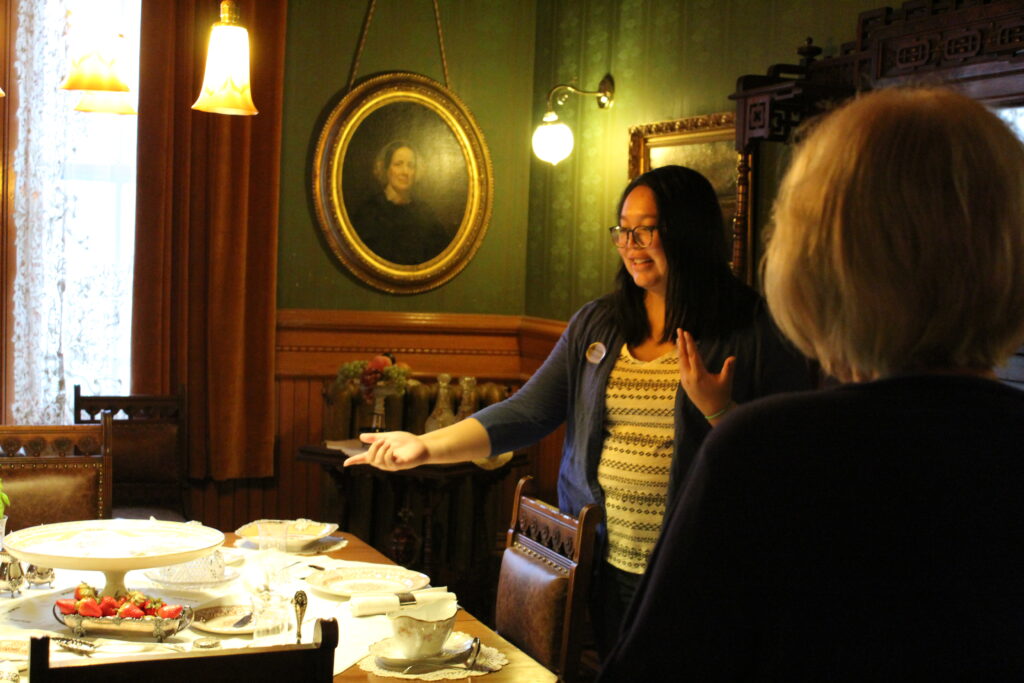 Come to the Dalnavert Museum for their monthly dementia-friendly tours. This program allows people living with early to moderate symptoms of dementia and their care partners to step back in time and explore the historic house and its collection.
Come to the Dalnavert Museum for their monthly dementia-friendly tours. This program allows people living with early to moderate symptoms of dementia and their care partners to step back in time and explore the historic house and its collection.
After your tour of the museum, enjoy tea and coffee and a closer look at some artifacts.
Please note: The upper floors of the museum are only accessible by stairs. If stairs pose a barrier, there will be the option of exploring the upper floors of the house with a tour guide in the Visitors’ Centre through our virtual tour. Folding cane-seats can be borrowed free of charge during your visit and there will be seating available throughout the museum.
Monthly Program
The last Saturday of every month, 10 – 11:30 am
Cost: $24.00 (plus tax) per pair and session, $12.00 per pair and session if one of the pair is a Dalnavert Museum Member
Register today on the Dalnavert Museum and Visitors’ Centre website
Fun!-Damentals of Table Tennis (Manitoba Table Tennis Association)
 The Fun!-Damentals of Table Tennis program connects people living with early to moderate signs of dementia and their care partners through fitness and friendship.
The Fun!-Damentals of Table Tennis program connects people living with early to moderate signs of dementia and their care partners through fitness and friendship.
Table tennis is a great aerobic exercise with proven cognitive benefits. Participants will take part in gentle recreational play. We will teach basic techniques and rules of the game while having tons of fun.
Winter Program (10 weeks)
Cornerstone Alliance Church, 1100 Autumnwood Dr, Winnipeg
Mondays, 6 – 8 pm
Jan 6 – Mar 17, 2025
*No session Feb 17*
Cost: $110 per pair
Register by emailing [email protected]
Tales Along the Trail (FortWhyte Alive)
 Tales Along the Trail is for people living with dementia and their care partners who are looking for a safe but exciting way to encounter the natural world. An experienced naturalist will guide the group along FortWhyte’s gentle pathways, pointing out all winter has to offer and encouraging everyone to use their senses to explore.
Tales Along the Trail is for people living with dementia and their care partners who are looking for a safe but exciting way to encounter the natural world. An experienced naturalist will guide the group along FortWhyte’s gentle pathways, pointing out all winter has to offer and encouraging everyone to use their senses to explore.
Each session will include a relaxing walk through the woods, with stops focusing on all of our senses. Participants will then have a chance to share thoughts, stories, and a snack around a crackling fire or cozy indoor space. In stormy weather, we bring nature indoors.
Winter Program (7 weeks)
Wednesdays, 1 – 2:30 pm
Jan 28 – Mar 4, 2025
Cost: $160 + GST/pair
Register today by contacting [email protected].
The Living Well Program (The Leaf)
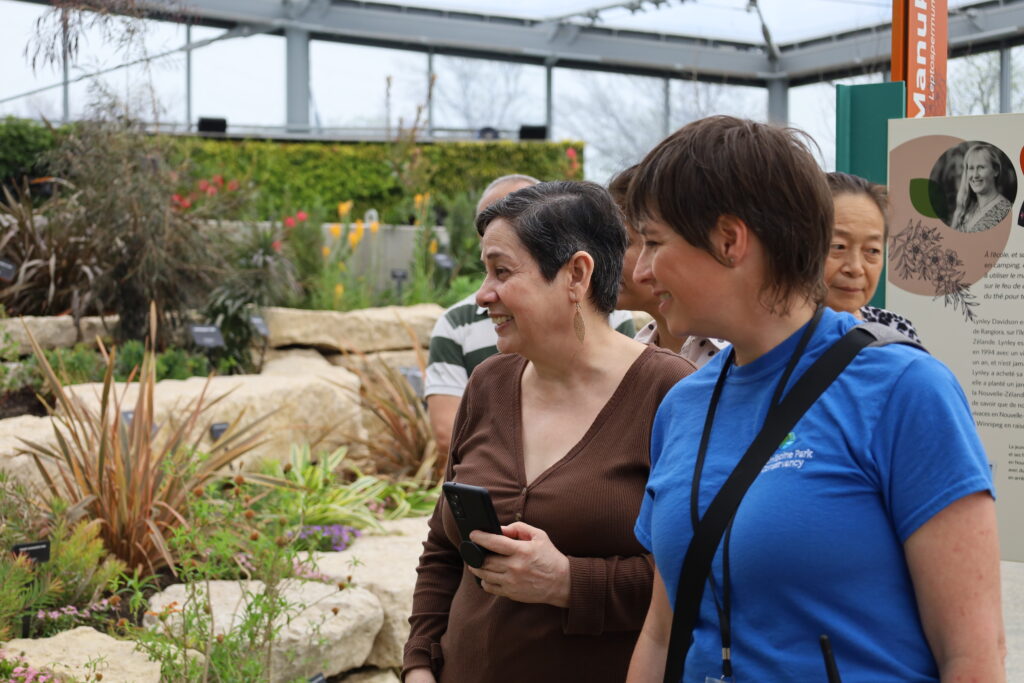
The Living Well Program enables people with early to moderate signs of dementia and their care partners to reap the social and well-being benefits of engaging with plants with the guidance of a practitioner of horticulture therapy.
We cultivate a dementia-friendly community with sensory plant-based activities, fostering social engagement, and guided explorations of The Leaf and outdoor gardens when the weather permits. Every session includes refreshments.
Winter Program (6 weeks)
The Leaf, 145 The Leaf Way, Winnipeg
Mondays, 2:15 – 4 pm
Feb 3 – Mar 17, 2025
*No session on Feb 17*
Cost: $150 + GST/pair
Tickets on sale beginning January 7. Register on the Assiniboine Park Conservancy website
Tune-Up Café (Convalescent Home of Winnipeg)
 Tune-Up Café is for individuals living with early to moderate signs of dementia and their care partners. It’s an inclusive and welcoming meeting place for singing, making social connections and sipping on a cuppa!
Tune-Up Café is for individuals living with early to moderate signs of dementia and their care partners. It’s an inclusive and welcoming meeting place for singing, making social connections and sipping on a cuppa!
Winter Program
Convalescent Home of Winnipeg, 276 Hugo St North, Winnipeg
Tuesdays, 6:15 – 8 pm
Winter program starts Jan 7, 2025
There is no fee to attend, but registration is required.
Contact Sherry at [email protected] for more information and to register.
Vivace Voices Choir (Canadian Mennonite University)
 Come and join us in making music together! Singing in a choir is a challenging and joyful experience. In this program, people living with early to moderate signs of dementia and their care partners will learn to sing new and familiar music while making connections with those around them. No prior choral experience is required.
Come and join us in making music together! Singing in a choir is a challenging and joyful experience. In this program, people living with early to moderate signs of dementia and their care partners will learn to sing new and familiar music while making connections with those around them. No prior choral experience is required.
Winter Program (11 weeks)
Canadian Mennonite University (North Campus), 500 Shaftesbury Blv.
Tuesdays, 6:30 – 7:30 pm
Jan 28 – April 8, 2025
Cost: $145 per pair
Learn more and register now on the CMU website
Follow Us On Social Media
Join us on Facebook, Instagram, LinkedIn and X (formerly Twitter) for the most current news, information and resources. If you’re already following us on social media, invite your friends to do the same!
X (formerly Twitter)
We Rely on Your Donations to Continue Our Work

Your gifts help support individuals, families and communities affected by dementia.
Remember. You Are Not Alone.
Are you struggling to figure out your next steps? Our First Link® Client Support team is here to listen and help guide you through difficult times – from when you are concerned about your own, a family member or a friend’s memory, right through to the later symptoms of dementia. Call us today at 204-943-6622 (Wpg) / 1-800-378-6622 (MB), email [email protected] or fill out our online form and we will reach out to you.


